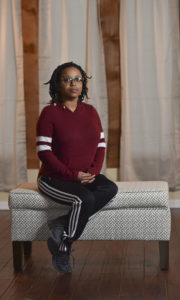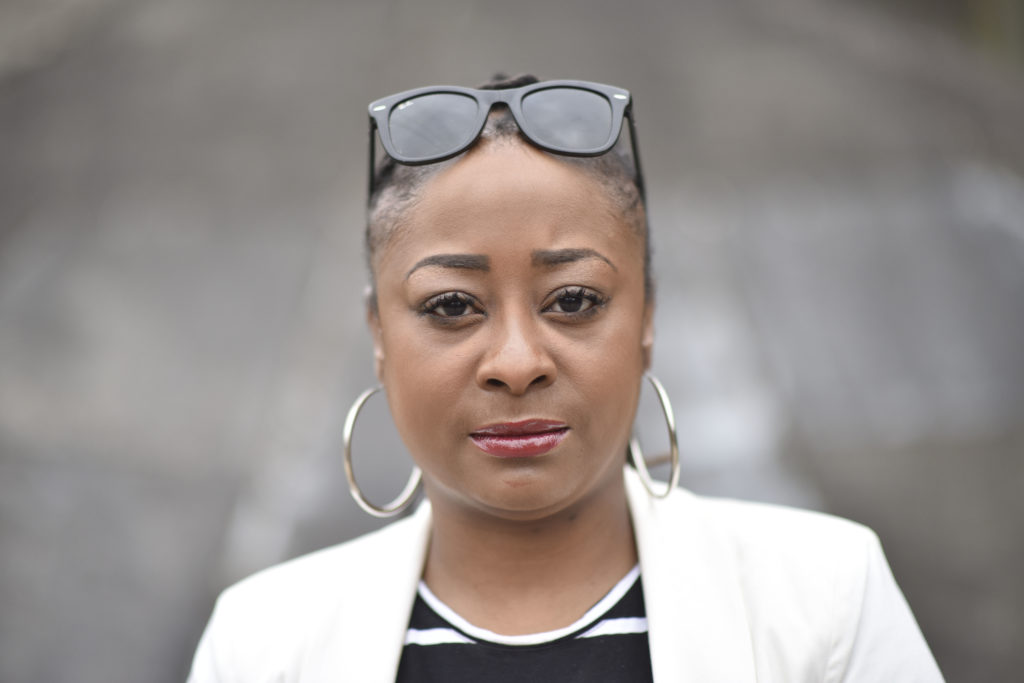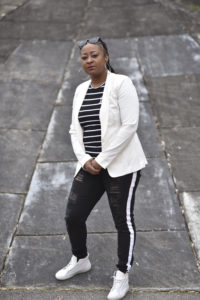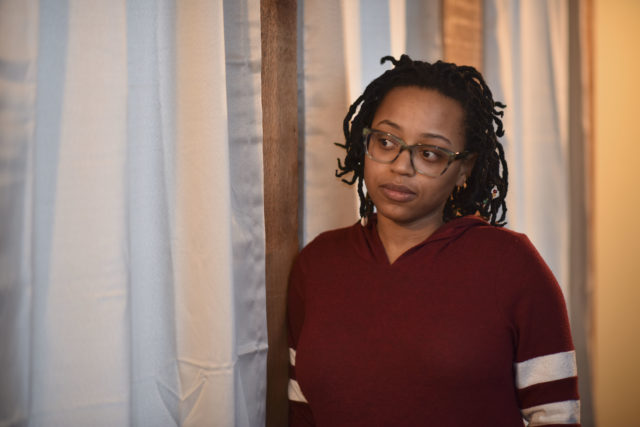By Je’Don Holloway Talley
For the Birmingham Times
Surviving Sexual Abuse
Gone are the days of silence and shame in the face of sexual assault and misconduct. America is slowly adapting to a new narrative for survivors of sexual abuse—one that empowers, vocalizes, and offers cathartic relief.
With there being strength in numbers and solace in solidarity, the country has taken a stance in support of the growing movement to lift the veil of secrecy and denial surrounding sexual abuse and sexual predators. #TimesUp, say African-American artists, such as actresses Kerry Washington and Viola Davis, film director Ava Duvernay, and mogul Oprah Winfrey. #MeToo, says activist Tarana Burke.
As silence now equates complicity, silence further cultivates a society ignorant of how sexual assault is so deeply woven into the fabric of America and the lives of women and children. In the wake of “Surviving R. Kelly”—a six-hour television documentary that aired on Lifetime earlier this month, revealing the accounts of several women who have accused the R&B singer of abuse, including keeping them secluded in a house and controlling them with fear and intimidation—women across the country and here in Birmingham have expressed how some of the victim’s stories brought back painful memories of their own traumatic pasts.
The impact is undeniable.
Social conversations continue to expose the need for social change to challenge the norms of yesteryear regarding child molestation, sexual assault, predatory behavior, and statutory rape. The Birmingham Times recently spoke with a group of survivors who have endured the trauma of sexual abuse and courageously stepped forward to share their stories as they navigate the road to recovery.
This is the first of two parts. The second part, to be published online Wednesday, Feb. 6 and in print on Thursday, Feb. 7, will feature interviews with counselors and therapists about the impact of sexual abuse and assault on the individual and society.

Angel Warren remembers being raped at knifepoint by a 16-year-old family member “every night except weekends.” Not on weekends, “only because I stayed with my grandma on the weekend,” she said.
At the time, Warren was 5; the abuse continued until she was 8. The now-28-year-old described what she endured as “a recurring nightmare. It felt like constant sleep paralysis.”
The year was 1995, though the Bessemer native still has trouble remembering in exact detail all that happened to her as a child.
“I know it’s my mind protecting me from it,” Warren said. “Over the years, [memories of the assaults] come in pieces. I will have an image of him getting me out of bed after everyone is asleep. Then I will see him on top of me. … I can [remember] the way he smelled, the fear I felt, the color of the walls. … I can remember all those things.”
Warren’s assailant would hold a knife to her throat and threaten to kill her father: “I was a daddy’s girl, so all I wanted to do was protect my dad,” she said.
“In my child’s mind, I’m thinking, ‘What did I do? Why don’t you [the assailant] like me?’ I remember what was in my mind. [I thought,] ‘You’re so mean, so very mean. I don’t like you. Leave me alone.’ I was always terrified of him. He was so rude and hateful.
“I felt trapped. I was so tiny [in comparison]. I’m five feet tall as a grown woman, so imagine the tiny thing I was at 5. He was a big teen, had to be more than 230 pounds. To a 5-year-old, that’s a giant.”
The only reason the abuse ended is because Warren’s abuser went to jail for an offense that she can no longer remember.
Suicidal
By the time she started attending [a Bessemer] high school, Warren tried to kill herself “consciously, twice; subconsciously, I lost count.”
As a teen, she wore a thick rubber band around her wrist to “pop the thought out” every time suicidal fantasies crossed her mind. She tried overdosing on pills and driving under the influence as a means of dying.
“I had no care for my life,” she said.
Until she began therapy, Warren had repressed many of the memories associated with her assaults. Counseling has helped her see that some of her bouts of depression and anxiety growing up were linked to her trauma.
Consequences
The sexual trauma led to other consequences for Warren.
“I was never faithful in a relationship,” she said. “I had like two or three boyfriends at a time. … I wasn’t sexual with all of them [but involved]. Before my husband, I was never in a long relationship, and I never wanted marriage. I was with my husband for eight years before we got married.”
The couple met in their senior year of high school, when they both were 17.
“Moments of ‘Don’t touch me’ or ‘Don’t do that’ right in the middle of a sexual act can ruin the moment because now I’m angry, and I don’t want it,” said Warren, adding that for a long time she associated anger with sexual relations.
“I thought aggressive, angry sex was the norm,” she said. “That’s how it’s supposed to be. The female gets no satisfaction, and it’s supposed to hurt like hell.”
A Saving Grace
Her husband, Gary, has been her saving grace. He is the force that drove Warren to reveal her abuse to her family and seek help.
“Gary was the first person I told,” she said. “[It] was a good 12 years [after the abuse], and I told him casually while sitting in his car in front of my parents’ home. … He told me he already knew I had been sexually assaulted because the majority of his female friends [had been] and he knew the signs. I tried having sex with him on our first date. Not saying that’s a tell-tale sign, but little things about my behavior [was similar to what] he had seen in his friends.”
Breaking the Silence
The University of Alabama (UA) grad remembers the day she finally revealed the trauma to her family. She was 21 and home on college break, and Gary pleaded with her to open up.
“I went rushing in the house and blurted out that [I had been raped] with tears running down my face,” Warren recalls. “My stepbrother Neil’s face was in disgust and anger. … He left the house cursing, and he doesn’t curse. [He was] mad at himself for not noticing. [He was] saying how he could have protected me.”
The eye-opener for Warren was her stepmother’s response.
“She made it about herself. That was my thinking then,” Warren said. “She [asked] me why I didn’t tell her because she had been raped as a child and would have understood. My dad wasn’t there. He’s a truck driver, and he was on the road.”
Family Matters
Back at UA the following day, Warren received a call from the Bessemer Police Department, who had heard from her dad and stepmom. That angered Warren because she felt like her story was hers to tell, and that they were out of line for taking it to the authorities. Besides, Warren asked, “What could be done about it now?”
Things were awkward between Warren and her family for some time.
“They didn’t see me for a while, and being around them was too awkward,” she said. “The mere mention of [my abuser’s name] in front of my dad sends [my dad] into convulsions. … His name is a curse word in my family.”
“Helicopter Mom”
The Bessemer resident—a registered nurse who is married and mother to a 2-year-old daughter—tries to use her experiences to help protect her daughter and other children.
“I’m protective of my child like a helicopter mom,” Warren said. “My child will never sleep over at others’ homes. … Even though she’s only 2-years-old, I use correct anatomy with her. Like with diaper changes, I tell her that’s her vagina. I’m not going to use cutesy names like I had to, like calling a vagina a ‘flower.’”
That’s to make sure children are properly educated, she said: “I’m big on children knowing their bodies and about sex because I don’t want a child to be overlooked if he or she tells their parent that so and so touched my cupcake or my flower.”
Therapy
When did Warren begin to heal? With therapy and her husband’s love and support. “He is the only one that gets me,” she said. “On my bad days, my worse-than-worse days, he gets me. I wish I had that when it happened.”
“I started therapy in 2018. I’m in [my therapist’s] office every week,” Warren said. “I don’t want medication. I want to find a way to heal and not have drugs mask my healing.”
Warren’s therapist employs a mix of steps to aid with the recovery: “We do a good bit of cognitive therapy. She challenges me, for sure.”
After telling her family, did Warren have closure?
“I felt both relieved and regretful for sharing,” she said. “Relieved that I admitted it to myself, my husband, my friends, and my therapist. With family, I felt like I finally let them know, but … I’m [regretful] because I could’ve kept it to myself if [I’d known] they were going to force me into telling the cops.”
Asked if she has healed, Warren said, “Honestly, I’m far from healed. … I have frequent panic attacks. I have an appointment to see my therapist [soon] because I just had a trigger.”
Asked if she considers herself a survivor of sexual abuse, she said, “I don’t like saying that I am because I didn’t survive it.”
“Yes, I’m alive, but it changed me,” Warren said. “I can be a very angry person. I’m a very depressed individual, and I hold things in. I’m still dealing with my abuse. There’s no survivor here.”
Surviving Sexual Abuse: April ‘7even Rich’ Richardson, taking back your power

, Survivors of sexual abuse. (Frank Couch for The Birmingham Times)
By Je’Don Holloway Talley
For the Birmingham Times

, Survivors of sexual abuse. (Frank Couch for The Birmingham Times)
At age 13, April Richardson fell victim to a respected member of her childhood church in Ensley. As a preteen, Richardson remembers being an outgoing, music-loving, aspiring emcee.
“I can identify with young girls wanting to be in the industry and attaching to somebody in the industry 100 percent because I was that person,” said Richardson, who often goes by the name “7even Rich.”
In the summer of 1997 Richardson was raped by “a fellow church member who was also a recording artist,” she said.
“He begged and begged my mother to work with me for a long time, saying he knew people he could hook me up with, he could get me in the studio, and things like that. … One day, [my mother] finally gave in.”
Her rapist, an up-and-coming gospel rapper at the time, who would be twice convicted for his crimes, had devised a plan to gain the trust of Richardson and her mother to lure Richardson into his care under the guise of getting her more exposure for her career.
“He picked me up with the intent of going to a gospel concert at a local church, but when we got there the concert was over,” Richardson said. “He said he had people at his home that he wanted to introduce me to and that we should go back there, … grill out, and meet some people.
“We went to his house, and that’s when things got weird.
“No one ever showed up, and he began to sexually assault me. First, he had me on the sofa, and then he dragged me to his bedroom. I felt his body weight pressing on mine. He felt like dead weight on top of me. He was this big, 6-foot-5, 200-pound man, and I was really small and thin. … I was a child.”
Richardson, now 35, said she fought with all her might for as long as she could.
“I felt like I failed myself because I’d always been a fighter from growing up in the hood and fighting all the time, and here I am in a situation where I can’t win,” she said. “I really felt helpless. After I saw I couldn’t fight him, I just kind of surrendered. … I laid there and cried.
“After it was over, he tried to get me to take a shower with him, I guess to wash away any evidence, but I wouldn’t. At this point, it was over. I guess he was trying to be nice so I wouldn’t do anything crazy in the moment. … I was like, ‘I’d just appreciate it if you would take me home.’ He said, ‘Listen, don’t tell anybody. This is only between me and you.’”
Once Richardson made it to safety, she told her brother, who was 16 at the time.
“He was in shock and angry,” she said. “He called our mom, [she was at work], and told her she needed to come home.”
Richardson’s mom called the police and took her daughter to the hospital: “The police came, and they did a rape kit.”
Nightmare
For Richardson, the nightmare did not end. The leadership of the church was notified, the members of the congregation found out, and yet her abuser was still welcomed at the church.
“When it happened, I was still going back to that church, and he was, too,” she said. “So, there would literally be times when my rapist was in the sanctuary with me. Because certain people knew what happened, they would try to come get me and warn me that he was there.
“I’m not saying that people have to shun people. I understand that it’s a house of God, but this is where I was around my rapist. He gets to come back with his wife and kids, and literally sit in front of me, laugh, and smirk at me as if it was a joke, like, ‘Ha ha. I got you, and I’m still here.’
“I will never forget the smirk. It’s the same smirk he had when he was on top of me raping me, wiping my tears away, asking why I was crying.”
Richardson’s church offered therapy and counseling sessions, but coming to the very place where she was around her rapist was not conducive to her healing. Asked if she felt coerced into silence, she said, “more like forgiveness. It wasn’t a big deal to [the church leaders].”
“I wouldn’t say [anyone] coerced me into silence, but [they] definitely tried to lead me to believe [the rapist] was empathetic, … trying to make me believe it wasn’t what it was, telling me things like, ‘He’s really sorry for what he did.”
The therapy sessions at her home church only made things worse, she said: “It’s like, if someone witnessed a loved one’s murder and then you take that person back to the murder scene for counseling. How’s that gonna help? “I was shy and withdrawn after that for sure. I didn’t really trust being around a lot of people or being open to meeting new people.”
Aftermath
The mental and emotional aftermath of sexual abuse can last a lifetime, said Richardson, adding that one of the things that helped her cope is knowing that she did not keep silent.
“I actually felt relieved because I just couldn’t see myself living like that and going through that self-torture,” she said. “Something in me just said, ‘I have to tell. I can’t keep quiet about it.’”
The trauma of sexual assault has had an effect on Richardson’s adult relationships.
“It definitely made me feel like sex wasn’t something I had to have,” she said. “I kind of felt like, ‘Eh, I’m good on that.’ I had boyfriends and stuff in school, so it wasn’t that I didn’t trust men, but I could really do without intimacy.”
Richardson said she began to heal when she testified against her rapist after he raped his 18-year-old daughter.
“[For] my offense he got only two years for rape one and sexual abuse,” she said. “Then he got out and reoffended; this time he raped his daughter. … That’s when they gave him 18 years with the possibility of parole in 2022. … I went to the trial. I had to testify.”
Testimony
“Testifying was empowering,” Richardson said. “By that point, I had done a lot of soul searching, and I was a little older. It felt good to look him in the eye and take my power back.”
Richardson said she felt vindicated after people had doubted her.
“When it happened, I wasn’t really believed,” she said. “[Testifying in court] was my moment. It was like, ‘See, I told you.’ That was the most freeing. Just to get an apology from some people who didn’t believe me the first time.”
Richardson said the trauma has given her a way of “digging deeper into my purpose and turning that experience into a positive.”
It also adds to her layers as an artist.
“I’ve put the details of what happened into my music, and some people have come and said, ‘Thanks for being real and honest.’ That helped me, too,” she said.
The song “Labor Pains,” on her 2009 mixtape compilation, touches on her experience and healing, which doesn’t come without prayer and purging feelings: “Deep prayer and actually writing down my feelings, [which come out in the music], was all very therapeutic at that time … and actually still is.”
Counseling
For years, Richardson did not seek help, but that has changed.
“It was fairly recent,” she said. “I didn’t seek professional counseling until my 30s. Praying is great, going to church is great, but sometimes there are things you just need to talk about to somebody who’s not in the church. The older I got, I realized that [seeking counseling] doesn’t make you crazy; it actually makes you sane because you know something is wrong.”
Asked how she feels about the #MeToo and #TimesUp movements, Richardson said, “I love it. At the same time, I feel sorry for a lot of the women that have come out because then people say, ‘Oh, they just want money.’ Still, I love the fact that women are feeling powerful enough to speak up and say #MeToo. I think it’s awesome.”
“Thriving”
Watching the recently aired Lifetime TV docuseries “Surviving R. Kelly,” Richardson said she empathized with the R&B singer’s alleged victims: “First, I just felt anger.”
“I know an ‘R. Kelly.’ This is somebody that was supposed to be guiding and mentoring you. … It made me angry to hear some of the things people were saying about the girls, victimizing them all over again,” calling them liars, saying they knew what they were getting themselves into and they should have left if they wanted to, she said.
As for Richardson, she continues to heal.
“I think my healing process is a journey,” she said. “Will I ever forget? No. I have forgiven him, though, and I told him that personally. One day [before he was re-incarcerated in 2004], he was in my neighborhood. His truck had broken down, and I passed by him. Then something said, ‘Turn around.’ So, I did. I pulled up and said, ‘Hey, I forgive you.’ He was surprised to see me. … He actually mentioned hearing my song on the radio and said, ‘I see you’re doing good with your music.’ … Then I drove off.”
Richardson said she’s doing more than just surviving.
“Survival is taking your power back and using it for the greater good,” she said. “I’m a survivor because I didn’t let that take over my life or end my life. … I’m thriving and surviving.”
To read how sexual abuse survivor Lashaundria Brown is no longer captive, click here.
To read how sexual abuse survivor Aiechia House is moving forward, click here
To read Marie A. Sutton’s column on sexual abuse, click here.





